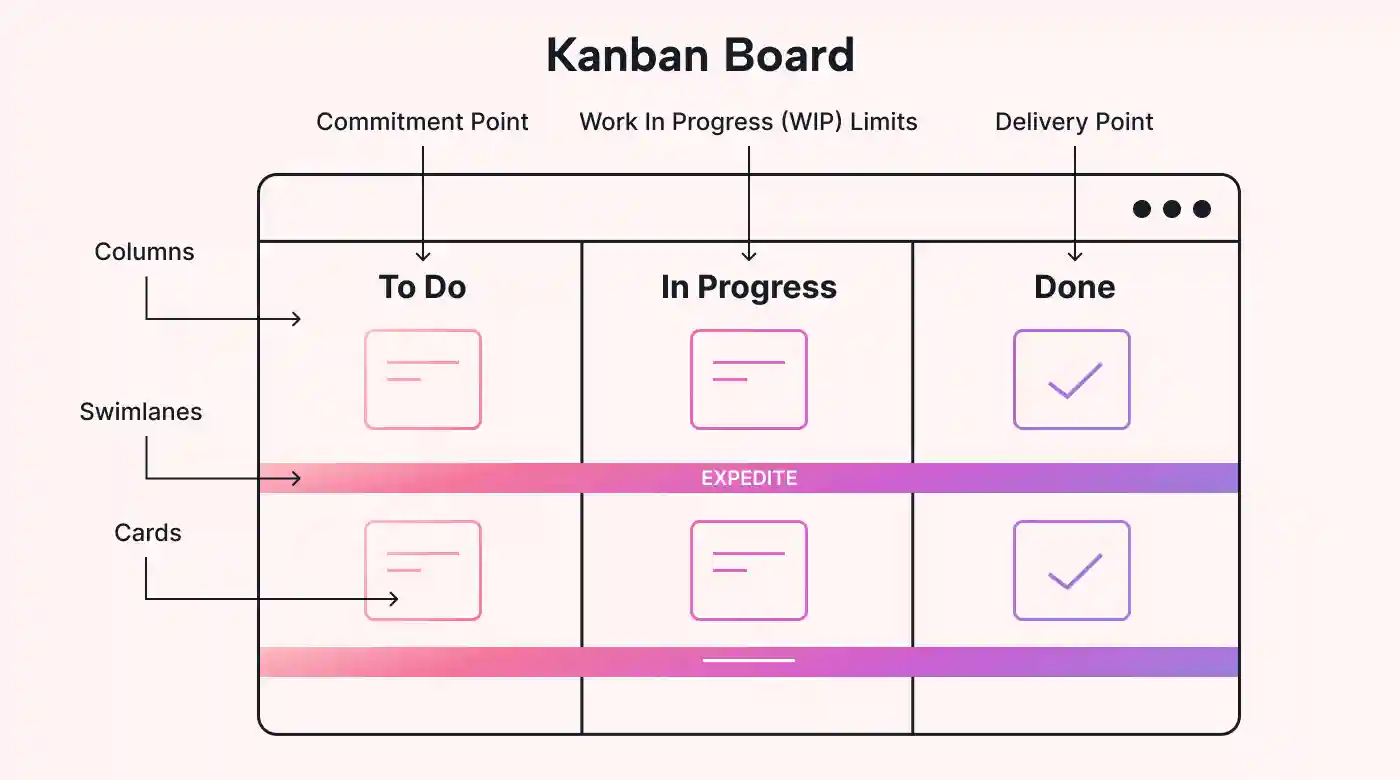Project coordination is the process of organizing, communicating, and facilitating the day-to-day execution of a project.
It encompasses a wide range of tasks, including assigning duties to team members, monitoring work progress, documenting key workflows, tracking project budgets, identifying potential bottlenecks, and ensuring seamless communication and information flow.
The ultimate goal of project coordination is to ensure that all stakeholders, from team members to clients, are aligned and working towards the successful completion of the project, within the allocated budget and timeline.
This alignment is crucial for maintaining the momentum of the project and ensuring that all efforts are directed towards achieving the set objectives.
Project management vs. project coordination
While both roles are essential to project success, there are significant differences. These have mostly to do with the scope of project responsibilities.
Project management is more strategic. It involves planning, organizational skills, and overall control of a project.
Project managers are responsible for setting goals, creating a solid project plan, and managing team members and external stakeholders.
You must also carry the can for delivery. Your team must complete the project on time, within budget, and to a quality acceptable to project owners and sponsors.
In contrast, project coordination focuses on the day-to-day business of keeping the project on track.
It’s a more tactical role. It involves the nitty-gritty details, and you’d handle all the elements listed above and control change management.
You’re also the canary in the coal mine for the project manager — sounding warnings of anything that may derail the project.

Why is project coordination important?
Effective project coordination is important for several reasons:
- Facilitates communication and data flow: Project coordinators act as a bridge between internal and external teams, ensuring open dialogue, brainstorming sessions, and the sharing of ideas and questions. This continuous flow of information helps maintain transparency and trust among all stakeholders.
- Promotes organization and timeliness: By managing project tasks, resources, and timelines, project coordinators help minimize risks and delays, keeping the project organized and ahead of schedule. This proactive approach ensures that potential issues are addressed before they escalate.
- Streamlines workflows: Project coordinators continuously monitor and improve workflows, adding structure and organization to project execution. This ongoing refinement of processes helps achieve higher efficiency and productivity.
- Enhances collaboration and teamwork: Effective coordination brings together individuals with diverse skills, expertise, and experiences, fostering a collaborative environment where team members can capitalize on each other's strengths. This synergy often leads to innovative solutions and better project outcomes.
- Manages stakeholder expectations: Project coordinators play a vital role in setting realistic expectations and eliminating misunderstandings, incorporating feedback from stakeholders in real-time. This alignment of expectations helps maintain stakeholder satisfaction and support.
- Tracks project progress: By closely monitoring the project's progress, coordinators can identify potential issues or bottlenecks and take proactive measures to keep the project running smoothly. This vigilance ensures that the project stays on track and meets its deadlines.
The key responsibilities of a project coordinator
While the exact job may vary from company to company, the sets of skills of a typical project coordinator job description are similar.
They focus on coordinating the daily activities of the project. The goal is to track progress and ensure that all team members are doing what they need to do:
Police the project schedule
Scheduling delays have a habit of creating a domino effect on your project timeline. That's why it’s a focus area for successful project coordinators.
And how?
You start by ensuring your project schedule has clear deadlines for each task, paying particular attention to tasks that depend on others to finish before they can start.
Technology can help you automate this piece. For example, once you know your tasks, allocate your resources, and set your priorities and dependencies, Motion’s Project Manager app can do the rest automatically.
Track project milestones and deliverables
It's the many moving parts that can make projects complicated.
Every task has a unique due date, owner, and priority — all of which can change along the way. Being a project coordinator involves organizing and tracking each of those project milestones and deliverables.
But (again) there are many tools available to help you stay on top of what needs to be done. A good example is a Kanban board, which enables you to visualize, manage, and improve the flow of project tasks and makes identifying bottlenecks in your workflows easier.
Monitor project costs
The project budget is usually the most inflexible element of any project. Staying within that is critical for successful project coordination. It means that you must closely track costs throughout the project. You should also always be on the lookout for cost-saving opportunities.
The easiest way to do that is to work with a detailed, task-based project budget. It should break down each deliverable into sub-deliverables so you can compare your actual costs to estimates at any point. A work breakdown structure can help with this.
Communication
Teamwork makes dreams work, and effective teamwork depends on regular communication with team members. Ditto for stakeholders. The job involves always sharing information about the project’s progress, requirements, scope, and objectives. You’d also need to prepare, review, and distribute project proposals, memos, and meeting minutes.
Creating a project communication plan is the most effective way to achieve this. In it, you record who needs what (e.g. regular meetings), when, and by what mechanism (e.g. meeting minutes). That'll help you ensure you deliver what every stakeholder and team member wants (or needs), when, and how they want it.
Documentation
The most maligned aspect of any project is documentation. Everybody hates it until needed, so it should be up-to-date and complete. It’s a key part of the job to manage all the “paperwork” associated with a project.
A project coordinator is expected to ensure that documentation is readily available so that team members (and key stakeholders) get what they need when they need it.
Organization
The job of a project coordinator also involves organizing. This goes for everything in the project lifecycle, from those regular project meetings with your team to following up on individual tasks. You’d also be expected to act as a supervisor on the project and to coordinate the activities of all team members, keeping the project workflow on track.
For meetings, you should take copious notes. After every meeting, you should then send your notes with action items to everyone involved. That way, everyone knows what’s expected of them, and can be held accountable.
Helpful project coordination tips and best practices
To get the most from your project coordination approach, consider the following expert-approved tips and best practices:
- Leverage project management software: Tools like Motion, an AI-powered project management platform, can significantly simplify project coordination. Features like task dependencies, prioritization, and reminders streamline communication, organization, and progress tracking. This technological support helps manage complex projects with ease.
- Utilize customizable dashboards: Customizable dashboards and filters in tools like Motion allow project coordinators to personalize workflows, add custom fields, and gain a holistic view of project status, aligning it with goals and reducing the risk of scope creep. This customization helps tailor the tool to specific project needs.
- Create a project coordination plan: Develop a comprehensive plan outlining your approach to coordination, including stakeholder communication, workflow organization, and risk mitigation strategies. This planning helps ensure that all aspects of coordination are covered and accounted for.
- Monitor team morale: Effective project coordination extends beyond task management; it also involves fostering a productive mindset, demonstrating empathy, and addressing potential sources of confusion or misunderstanding. This focus on team well-being helps maintain motivation and engagement.
- Leverage AI-powered tools: AI-powered writing assistants like Motion AI can streamline project coordination by quickly creating detailed project plans, capturing meeting notes, and summarizing key ideas, saving valuable time and resources. This technological support helps enhance efficiency and productivity.
Project coordination in Motion
To be an ace project coordinator isn’t difficult, but it can be a challenging job.
At the same time, it can be very rewarding, especially when you manage to get the cats all moving in the same direction.
You must be willing to learn new things. Constantly. You must also be a little adventurous and prepared to try new collaboration tools and technologies. First-mover advantage is a real thing that can help you coordinate your projects more efficiently.
Motion can help you with your cat-herding responsibilities. It’s AI-based project management software that can help you build the most effective project schedules. Once you’ve done that, Motion will help you keep your cats aligned and let your project really fly.
If you're ready to try a new tool, it's time for you to try Motion. There's a 7-day free trial waiting for you.

After 40-odd years of working in technology, project management, media, and marketing, Brian's career and growth journey has exposed him to a wide range of niches. He brings this breadth of knowledge and expertise in his content work through enriched storytelling and original concepts that make SaaS content engaging and accessible for readers of all stripes.





